Ashley Woodiwiss
Democracy Agonistes
Why hand-wringing about partisanship is pointless.Discussed in this essay:
Seyla Benhabib, ed., Democracy and Difference: Contesting the Boundaries of the Political (Princeton Univ. Press, 1996).
James Bohman, Public Deliberation: Pluralism, Complexity and Democracy, (MIT Press, 1996).
Robert Dahl, On Democracy (Yale Univ. Press, 1999).
Stanley Fish, The Trouble with Principle (Harvard Univ. Press, 1999).
Amy Gutmann and Dennis Thompson, Democracy and Disagreement, (Harvard Univ. Press, 1996).
Jeffrey C. Isaac, Democracy in Dark Times (Cornell Univ. Press, 1998).
Stephen Macedo, ed., Deliberative Politics: Essays on Democracy and Disagreement (Oxford Univ. Press, 1999).
It was an American moment. The defeated candidate made his long-awaited concession speech. The winner was charitable in his contested victory. With the campaign finally at an end, on the evening of December 13, 2000 both the vanquished and victorious now sought to cast out the devil. Said the vanquished: "Partisan rancor must yield to patriotism." And the victor: "It's time to put politics behind us and move beyond the partisanship of the recent past." On that night we heard from both how Americans are "one people, with one history and one shared destiny," and how we must "rise above our house divided." These sentiments were praised by pundits and political leaders alike over the course of the next several days. The entire post-November 7 period of contestation in Florida had been viewed as nothing more than a display of serial partisanship with politicians and commentators attacking each other. Accompanying this had also been a ritual indulging in hand-wringing over whether this situation constituted a crisis for our democracy. With Campaign 2000 it appeared that may be our politics had become, well, too political.
This demon of partisanship has tormented the American political psyche from the time of our founding. It was Madison in Federalist Paper #10 who warned against the "mischiefs of faction," which he considered the disease natural to democratic republics. It is a peculiar cast of mind we Americans possess. As participants in what the framers considered the novo ordo seclorum ("a new order for the ages"), we Americans seem to believe that the ideal society would be one is which there were no politics, for politics is partisanship, and we seem to hold it as a self-evident truth that partisanship is problematic, something to be gotten beyond, overcome, silenced. For many Americans, the only good politics is no politics at all.
Such "end of politics" thinking continues in our day, and its possibilities or impossibilities constitute the thread of continuity in the works here considered. In the professional academy there is a spirited debate among those theorists who embrace a model of "deliberative democracy," which they believe can in one form or another help mature democratic societies navigate through the troubled waters of partisan differences, and "agonistic democrats," who reject such speculation as not just utopian but a subtle form of partisanship in its own right. The central question this literature raises is whether or not partisanship is something that we can ever overcome. Our answer to that question will deeply inform the nature of our political judgments and the character of our political actions. At bottom, it's the issue of what we believe democracy is all about.
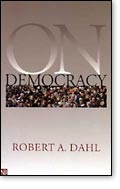
On Democracy
The Present Democratic Moment
Robert Dahl, the dean of democratic theory, notes in his little primer, On Democracy, that the specific democratic goals that societies pursue have everything to do with their historical context. Dahl estimates that there are about 65 democratic countries out of the more than 200 nations of the world. Among these, some countries are in transition to democracy, others are newly formed democracies. He counts 22 as forming the older democracies "where basic democratic institutions have existed continuously since about 1950." Each has its own problems, its own issues. But as Dahl puts it, "for the older democracies, the challenge is to perfect and deepen their democracy" (emphasis in the original).
All the books considered here are exclusively concerned with these older democracies. Indeed they focus almost exclusively upon the United States (though Canada and western Europe get some comment). Dahl was one of the first political scientists to give this group of political societies an historically specific name of its own, polyarchy.[1] By that term he refers to the six political institutions which modern large-scale democracies require: election of public officials; free, fair, and frequent elections; freedom of expression; alternative sources of political information; associational autonomy; and an inclusive conception of citizenship. Dahl's brief book is an excellent starting point, for in it, like a contemporary Aristotle, he surveys the history of democracies, considers ideal and actual democracies, and examines those conditions favorable and unfavorable for democracy.
In his concluding chapter, "The Unfinished Journey," Dahl sounds the note that serves as the point of departure for the other works considered here. He looks to the future and is troubled: "We can predict with considerable confidence, I believe, that certain problems democratic countries now face will remain, and may even grow more daunting." Dahl points to the effects of the market economy upon political equality, the rise of internationalization (which locates decisions farther away from democratic control), the increasingly culturally diverse natures of democratic societies, and the lack of civic education, all of which combine to make the future of democracy "too uncertain to provide firm answers."

Deliberative Politics
While democracy enjoys a resurgence around the globe, the older democracies have entered what appear to be "dark times," as Jeffrey Isaac has suggested. In deed, both the Gutmann and Thompson and the Macedo collections take as their starting point the apparently intractable nature of moral-political disagreement in democratic societies. As Gutmann and Thompson assert at the very beginning of their volume: "Of the challenges that American democracy faces to day, none is more formidable than the problem of moral disagreement." Benhabib also points to how "contemporary Western liberal democracies are being challenged by groups who insist upon their unassimilatable difference and who want to use their experience of alterity to demystify the rationalist and identitary illusions of these liberal democracies." Meanwhile, Bohman maintains that "the 'facts' of modern society, particularly its pluralism and complexity, seem to be strong prima facie obstacles" to democracy. And Isaac (as if his title doesn't communicate his concern clearly enough) reports that "there is a wide spread consensus among political analysts that liberal democracy in what used to be called 'the West' is in decline, that liberal democratic regimes have proved themselves ineffective and decreasingly legitimate in the eyes of their citizens." From the perspectives of some of our leading political theorists, then, democratic societies are riven by partisan political forces which threaten the dream of democratic unity. Can a democratic solution be found to solve this problem?
Situating Deliberative Democracy
Since the 1990s, deliberative democracy has become the standard term within the field of academic democratic theory for those who argue that neither liberalism nor communitarianism (the great theoretical alternatives of the 1970s and '80s) provides a sufficiently democratic model of the public sphere. As Peter Berkowitz has commented, "In political theory these days, no question seems more pressing or more pervasive than the question of how democracy in America can be made more deliberative." No longer liberals or communitarians, Berkowitz writes, "to day we are all 'deliberative democrats.'"[2] Deliberativists fault both liberalism and communitarianism for missing the complex nature of democratic public discourse. For Macedo, "Deliberative democratic ideals respond to many of these disparate sources of complaint by arguing for a more wide-open and inclusive model of democratic discourse." The solution for what ails democracy—so these theorists argue—is simply more democracy, or at least more democratic talk in more public spaces.

Public Deliberation
Above all, deliberative democrats believe that contemporary democracies can be so organized that deep-seated partisanship can be tamed and reasonable decisions arrived at. Bohman, in the face of acknowledged social complexity and values pluralism, claims to "elaborate an account of public deliberation that is robust and practical enough to withstand skepticism about the prospects for deliberative arrangements under current conditions." Gutmann and Thompson, while conceding that "we are destined to disagree" at the level of basic moral principles, see in their model how "deliberative democracy also affirms that we are capable of deciding our common destiny on mutually acceptable terms." And Benhabib, cognizant of partisan forces at work in newer and older democracies alike, holds to the belief that "the institutions and culture of liberal democracies are sufficiently complex, supple, and decentered so as to allow the expression of difference without fracturing the identity of the body politic or subverting existing forms of political sovereignty."
The key is not to get citizens to agree at the level of moral-political values, but rather to agree at the level of procedure; that is, how we should structure the public discussions and decision-making processes whereby we try to peacefully resolve our differences. Like the Beatles, deliberative democrats believe that "we can work it out."
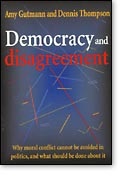
Democracy and Disagreement
This unapologetic faith in reason, progress, and the possibility for human emancipation through rightly structured institutions and procedures is particularly clearly expressed in Gutmann and Thompson's popular and important work, Democracy and Disagreement. The authors view deliberative democracy as all about a public reason-giving process that binds citizens and policy makers alike. Reciprocity is the name they give to the principle which regulates the kind of reasons that should be given in rightly ordered democratic public deliberation. By reciprocity, the authors point to "the capacity to seek fair terms of social cooperation for their own sake":
Because the results of democratic deliberation are mutually binding, citizens should aspire to a kind of political reasoning that is mutually justifiable. From a deliberative perspective, a citizen offers reasons that can be accepted by others who are similarly motivated to find reasons that can be accepted by others. … But even in the face of what we call deliberative disagreement, reciprocity calls on citizens to continue to seek fair terms of cooperation among equals.
For Gutmann and Thompson, reciprocity has both a moral and an empirical requirement. The moral requirement holds that to participate in the deliberative process one must be motivated by a desire to reason in a way "that can be shared by fellow citizens" who are similarly motivated. The empirical requirement demands that whenever empirical claims are invoked in deliberative reasoning they must be "consistent with relatively reliable methods of inquiry." The authors maintain that deliberative democracy does not require a consensus on public policy or constitutional law. Rather what it does require is a consensus on those principles "that set the conditions of political discussion." A deliberative democracy governed by the principle of reciprocity "expresses as complete a conception of a common good as is possible within a morally pluralistic society. Recognizing that politics cannot be purged of moral conflict, it seeks a common view on how citizens should publicly deliberate when they fundamentally disagree."
But this seemingly benign principle receives stiff criticism from a number of contributors to the Macedo volume, a collection of critical essays gathered specifically in response to Democracy and Disagreement. Ian Shapiro ("Enough of Deliberation") considers how the concept of reciprocity works to discipline those who might bring fundamentalist assumptions to the deliberative table. When Gutmann and Thompson argue that their model does not "repudiate religion" but only those kinds of religious claims "whose conclusions are impervious, in principle as well as in practice, to the standards of logical consistency or to reliable methods of inquiry that themselves should be mutually acceptable," Shapiro sees the fundamentalist being told "that it's fine to be a fundamentalist so long as she abandons her fundamentalism." For Shapiro, the Gutmann and Thompson model "works only for those fundamentalists who also count themselves fallibilist democrats."
William Galston ("Diversity, Toleration, and Deliberative Democracy") picks up a similar line of criticism when he observes how Gutmann and Thompson apply their model to the well-known controversy between religious fundamentalists and the public school board of Hawkins County, Tennessee, siding with the school board (and the Sixth Circuit Court of Appeals, which had the final ruling in the matter) over the parents' objections to the use of a specific line of English readers they regarded as subversive of their child's faith. Gutmann and Thompson frankly acknowledge that their principle of reciprocity is biased against fundamentalists and in favor of those whose beliefs, religious or not, conform to their deliberative model: "the principle is not neutral among religions or ways of life." To which Galston responds with civil incredulity: "It is difficult to imagine that any liberal democracy can sustain conscientious sup port if it tells millions of its citizens that they cannot rightly say what they believe as part of democratic public dialogue."
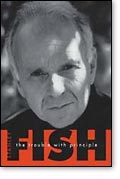
The Trouble with Principle
Stanley Fish ("Mutual Respect as a Device of Exclusion") is characteristically more blunt in his criticism of Gutmann and Thompson and deliberativists generally: "Their commitment, despite assertions to the contrary, is not to deliberative democracy but to particular outcomes."[3]
A similar debate takes place in Benhabib's Democracy and Difference. In her essay ("Toward a Deliberative Model of Democratic Legitimacy") Benhabib claims
it is a necessary condition for attaining legitimacy and rationality with regard to collective decision making processes in a polity, that the institutions of this polity are so arranged that what is considered in the common interest of all results from processes of collective deliberation conducted rationally and fairly among free and equal individuals.
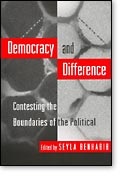
Democracy and Difference
This emphasis upon agreed-upon procedures is the particular burden for societies living with values-pluralism. In such democracies, agreements "are to be sought for not at the level of substantive beliefs but that of procedures, processes, and practices for attaining and revising beliefs." She concludes: "Proceduralism is a rational answer to persisting value conflicts at the substantive level."
But to see what happens when Benhabib's deliberative "reflexivity" is at work, we must visit the footnote that attaches to the above cited quote. There Benhabib tries to wrestle with the knotty problem of "religious sects living within the boundaries of the liberal-democratic constitutional state" and how her "deliberative reflexivity" can accommodate the peculiar nature of claims which Orthodox Jews in Israel, Orthodox Muslims in France, and Christian Scientists in the United States have brought to their real-world concerns. Military service has been the issue for the first, public education of women for the second, and medical intervention for the last. Though she admits that her model may "presuppose too strong a model of agreement," she maintains that even in the face of the challenges these kinds of communities pose, "a form of deliberative proceduralism is the most viable normative answer." She then proceeds to her analysis.
What is most instructive here, I think, is not what Benhabib concludes—Orthodox Jews should not be forced to serve in the military, Muslim women should be forced to attend public school but permitted to wear their chador (head scarves), and Christian Scientist parents ought to be forced to provide medical care for their sick children—but how these conclusions are reached, and indeed, the fact that she concludes at all. For in doing so, she exhibits some of the very qualities that—so critics of deliberative democracy claim—are conveniently hidden from view in all such models. For Benhabib's "deliberative proceduralism" to work, she must invoke a number of (prior and assumed to be universally held) juridical concepts such as separation of church and state, rights, and equality which frame the what and how of deliberative decision-making. With such "self-evident" assumptions smuggled in place, it is no surprise that her deliberative reflexivity cashes out in the particular political decisions it does.
Agonistic Democracy
Deliberative democrats maintain that the solution to the problem of protracted partisanship is the creation of mechanisms for governing democratic deliberations. However, deliberativists are confronted by the charge that their model, while professing to be open to difference and inclusion, cannot itself escape an element of exclusivism that in practice would harm the identities of particular communities. For example, Chantal Mouffe ("Democracy, Power, and the 'Political'") argues in the Benhabib volume that proponents of deliberative democracy "generally start by stressing what they call the 'fact of pluralism' and then proceed to find procedures to deal with differences whose objective is actually to make those differences irrelevant and to relegate pluralism to the sphere of the private." Indeed, Benhabib openly acknowledges that among theorists of democracy there is a tension between "defenders of the proceduralist-deliberative model of democracy" and those who work with an "agonistic model of democratic politics."
There is then an agonistic critique of deliberative democracy present in both the Benhabib and Macedo collections. Agonists acknowledge up-front the ineliminable reality of contest, struggle, and exclusion in democratic politics. All efforts to theorize a "solution" to the messiness of democratic politics "must be rejected," claims Mouffe, "since the recognition of undecidability is the condition of existence of democratic politics." To articulate, as deliberativists do, a model of the well-ordered democracy is at the same time to posit a democracy from which politics has been eliminated. Fish sees this at work in Gutmann and Thompson's principle of reciprocity:
It is because politics cannot be freeze-framed at the moment its wheel of fortune delivers an outcome you favor that Gutmann and Thompson want to bypass the political process and turn to reason of a "stronger kind," to principled reasons. These stronger reasons would hover above the political process and intervene when ever it was about to take a wrong turn. In this way, the "hope of liberal theory," the hope that citizens can "agree on principles" that will once and for all circumscribe the political agenda, will have been realized.
The presence of the agonistic voice in these volumes brings to light how we think about democracy and politics. Over and against the modernism of deliberativists, who put their faith in reason, institutions, and procedures, these agonists employ a more postmodernist perspective in arguing that behind such gleaming principles and procedures lurk an already-in-place political agenda. Mr. Locke, meet Mr. Machiavelli. The question for us is, What lies in the balance between these contending models of democracy?
Deliberative democracy offers us a view of democratic harmony, a politics that can domesticate our partisan proclivities. But agonists refuse such sanguine scenarios. In the end I think the agonists may well be right. Why this is (and must be) so can be seen by considering the Fish and Isaac volumes. At the end of the day all we may have is agonism, but that's not necessarily such bad news.
Fish, in a collection that combines previously published and new essays, comes preaching what he calls "the gospel of politics." His gospel is that we are political creatures "all the way down." We can no more avoid being political than we can being physical. But while "conflict is the name of our condition," nevertheless "politics, interest, partisan conviction, and belief are the location of morality." For Fish, all efforts by political theorists to overcome this situation are simply rhetorical strategies to get specific political goods or attain specific political ends by masking these desires behind an appeal to neutral principles (hence the title to this collection).
His trouble with "principles," then, is the lack of candor or forthrightness, even the air of moral superiority, which characterize those who employ such a strata gem. After a critique of John Locke (the fons et origo for the particular liberal cast of mind Fish strives so mightily to unmask) and contemporary liberal theorists like Nagle, Conkle, and Gutmann and Thompson, he describes the ineluctable logic at work whenever liberal philosophers take recourse in neutral principles:
Someone sets out to solve the problem presented to a would-be regime of tolerance, or higher order impartiality, or openness of mind, or mutual respect, by views that are manifestly intolerant, have no truck with impartiality, and accord respect largely to those who already agree with them; and invariably the solution that emerges is a mirror version of the problem it claims to address. Tolerance is defined in a way that renders the troubling views unworthy to receive it; openness of mind turns out to be closed to any form of thought not committed to its hegemony; and mutual respect is less a formula for ecumenical generosity than the cant phrase of a self-selected little club of right-minded academics.
Agonism rejects the confidence of modern rationalist models, putting in its place a view of human nature at work in the world that is closer to the Christian view. And yet beyond agonists' rejection of the modern universalist dream of a harmonious (that is, nonpolitical) political society, lies their enthusiasm for taking politics seriously. Agonists are not Anabaptists.
Doing What Comes Naturally
for Fish the rejection of principled liberalism or deliberativism concludes not in an anti-political prescription. (For how could that be if indeed we are political all the way down?) Rather, it ends with what might be called a form of elemental agonism: play politics, and play it to win. If politics is all-pervasive and is even inside our attempts to avoid it, then the only thing to do is to just do it. We cannot do otherwise. In Fish, gone is the hope for some one-day-to-be-realized nonpolitical democratic society. But set before us is the real concrete world of local problems, temporary solutions, floating coalitions, defeats and victories. In other words, in agonistic thought lies the real world of everyday politics.
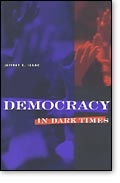
Democracy in Dark Times
This is precisely the mood that informs Isaac's Dark Times. As a work of "practically oriented political theory" Isaac's book is both a criticism of academic political theory for its lack of engagement with concrete democratic politics and an effort (inspired by the thought of Hannah Arendt) to do just that. This is a kind of democratic theory concerned "with the average citizen's capacity to act and form his own opinion." In these eight essays (two of which appear here for the first time) Isaac is concerned to show how academic theory, in ignoring this practical dimension, closes itself off to real democratic possibilities in the world. For Isaac, if theorists would take seriously the work of such associations and citizen initiatives as Charter '77, Solidarity, Amnesty International, the Helsinki Citizens' Assembly, and the Industrial Areas Foundation, they would observe "oases in the desert," by which he means "a crucially important form of democratic politics at a time when the more normal and authoritative forms are in disrepute."
Isaac identifies himself as an agonistic democrat theorist in his introduction, embracing the key theme of "resistance," which permeates the agonistic literature. However, Isaac is also careful to distinguish himself from fellow agonists chiefly by the tone he takes. Rather than another effort at unmasking the pretensions of liberal and deliberative models, Isaac focuses instead on those kinds of democratic initiatives that "represent modestly constructive efforts to develop forms of civic identity, responsibility, and agency that might resist not so much the normalization of the world but the profoundly deracinating disorderliness and irresponsibility of our world."
So while he shares the agonistic view of the omnipresence of contentious and fractious conflict woven within late modern democracies, Isaac clings (following Camus) to the "modest thoughtfulness" that can and does pervade everyday life. "Such a thoughtfulness," Isaac writes, "in its modesty and in its courage, in its disappointments and in its tenacity, has proved itself a vital if limited force in our time. And as long as it remains with us, as it does, there is yet cause for hope."
Agonism in the hands of Fish and Isaac leaves us with an appropriately chastened view of politics. There's no getting around it: democracy is hard work. And this is Dahl's message as well. After his historical survey of the democratic experience he concludes, "it is clear that we cannot count on historical forces to insure that democracy will always advance. … Democracy, it appears, is a bit chancy. But its chances also depend on what we do ourselves."
Perhaps one lesson we can derive from all this is that hand-wringing about partisanship is pointless. For partisanship we will have with us always. The problem is not with politics nor with partisanship. In fact, in this sense, there really is no problem at all. To reject the dream of a non-conflictual political society is not to condemn us to despair or passivity. We end with Isaac's "vital if limited force" of modest thoughtfulness. Within such chastened democratic thinking we can even hear the echoes of St. Augustine, whose own political theology was capacious enough to allow for towering structures of evil (inspired by the ineradicable libido dominandi) but also for modest virtue. Does agonistic democracy provide inspiration for some subsequent Christian rethinking about politics? Now that's a matter well worth deliberating.
Ashley Woodiwiss is professor of political science at Wheaton College.
Footnotes:
1. Dahl and a colleague first floated this term in 1953. It achieved mainstream acceptance with the publication of his Polyarchy (Yale Univ. Press) in 1971. In the balance of this essay, when we talk about "democratic societies" or "democracies," we are talking almost exclusively about what Dahl refers to as "polyarchal democracies" and what others refer to as "liberal democracies."
2. Peter Berkowitz, "The Debating Society," The New Republic (November 25, 1996), pp. 36-42.
3. Space does not permit a complete account of the Macedo volume, an indispensable collection on the promise of and limits to deliberative democracy. For my purposes here I have emphasized the latter. But a full half of the volume is made up of pieces that are critically supportive of the Gutmann and Thompson model. The volume also includes a response by Gutmann and Thompson to all the contributors.
NOTE: For your convenience, the following products, which were mentioned above, are available for purchase:
• Democracy and Difference, Seyla Benhabib
• Public Deliberation, James Bohman
• On Democracy, Robert Dahl
• The Trouble with Principle, Stanley Fish
• Democracy and Disagreement, Amy Gutmann and Dennis Thompson
• Democracy in Dark Times, Jeffrey C. Isaac
• Deliberative Politics, Stephen Macedo
Copyright © 2001 by the author or Christianity Today/Books & Culture Magazine.
Click here for reprint information on Books & Culture.








No comments
See all comments
*